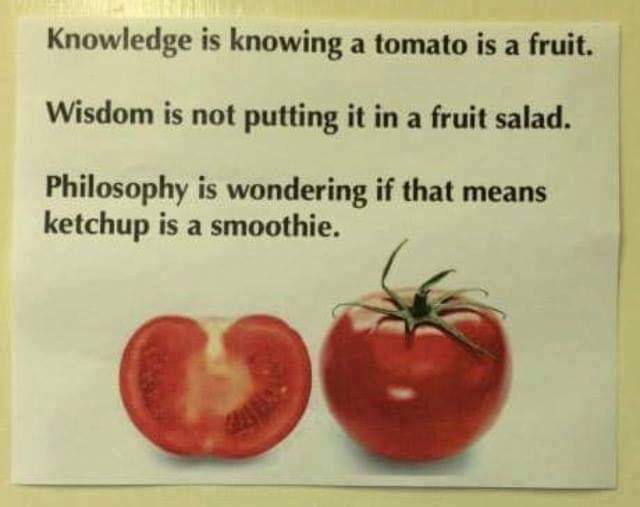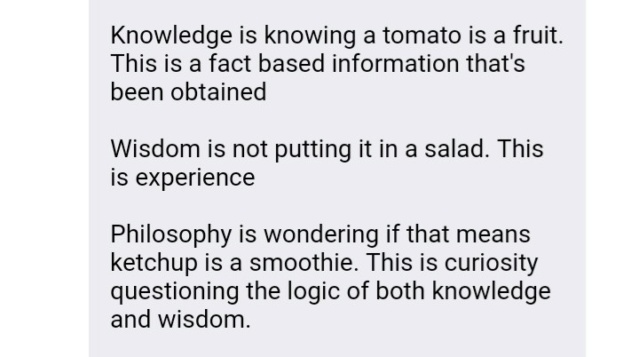Denkverbot
Page 19 of 50
Page 19 of 50 •  1 ... 11 ... 18, 19, 20 ... 34 ... 50
1 ... 11 ... 18, 19, 20 ... 34 ... 50 
 Re: Denkverbot
Re: Denkverbot
violator wrote:Gnječ wrote:kic wrote:
Jedini ljudi koji stvarno žive su oni koji imaju vremena za filozofiju jer njih ne zadovoljava to da budu jedino dobri čuvari vlastitog života.
« Oni svaki vijek sjedinjuju sa svojim; sve godine koje su prošle prije njih dodatak su njihovim zalihama. Ako nismo previše nezahvalni, svi ovi ljudi, slavni tvorci svetih misli, rođeni su zbog nas; nama su popločili put u život.»
Seneka
filozofija je umjetnost pretakanja iz šupljeg u prazno.
Gnječ
Sto sam rekla! : ))))
pa dugotrajnim promatranjem došao sam do zaključka da filozofija nije nikakva znanost ili majka svih znanosti kako joj se tepa nego jedna od vrsta umjetnosti. poput muzike, slikarstva, kiparstva, književnosti, poezije, film itd...postoji i umjetnost koja se zove filozofija. sad kao u svakoj umjetnosti ima pravih remek djela ali ima i šunda, pseudo-umjetnosti. filozofija se dijeli da žanrove isto kao i muzika gdje postoji klasična muzika koja ima isto svoje podvrste, pa rock, pa pop, pa country, pa cajke, turbofolk itd. netko sluša cajke i Tonsona i jebe mu se za Mozarta ili Verdia. jedan koga poznam je metallaro znači metalac i ne jebe blues pol posto. Iron Maiden RULZ! i svi hvale muziku koja im paše a pljuju po svoj ostaloj muzici. tu zna u diskusijama doći i do verbalnih sukoba.
znači filozofija je kao kad kažemo muzika, film itd općenito ne znači ništa. koja je svrha umjetnosti? da li je svaka umjetnost umjetnost? što je šund? što je pseudo-umjetnost? ima jedna grana filozofije koju su hrvati primijenili u praksi a zove se uhljebnička filozofija koja je otkrila modus kako dobro živjeti bez rada. sva se filozofija uglavnom svodi na persuaziju.
persuazija (latinski persuasio: uvjeravanje, nagovor), oblik komunikacije u kojem se racionalnim sredstvima (argumentima, informacijama i sl.) nastoji djelovati na prosudbe, stavove, vjerovanja ili djelovanje pojedinca. Uspješnost persuazije ovisi o svojstvima same komunikacije (npr. obrazloženosti argumenata, vjerodostojnosti izvora informacija, autoritetu i osobinama osobe koja uvjerava), kao i o svojstvima pojedinca na kojega se persuazivno djeluje (npr. o njegovim čuvstvenim reakcijama prema izvoru informacija, već postojećim vjerovanjima i sl.). Ispitivanja procesa persuazije pokazala su da njezina uspješnost ovisi o nizu racionalnih i iracionalnih čimbenika. Persuazija se provodi i kao oblik psihoterapije.
Guest- Guest
 Re: Denkverbot
Re: Denkverbot
violator wrote:Gnječ wrote:violator wrote:Zadnjih dana gori si od Sekspira i Abena zajedno. Bljuv. :)
prestani čitat Ničea.
A ti prestani srat'.
i sranje je filozofija. sad bih to mogao produbit jer sranje je vrsta filozofije koja je pseudo-filozofija, šund, kič. znači kad kažeš nekom ne seri to znači da ga smatraš kič filozofom ili filozofom iz hlebina.

Guest- Guest
 Re: Denkverbot
Re: Denkverbot
...i tako...smorila me filozofija odoh radit a rad je filozofima smrtni neprijatelj. odoh sjest pored rascvjetalog jorgovana u vrtal i recitirat filozofsku mantru:
Ala je lijep
ovaj svijet,
Ondje potok,
ovdje cvijet;
tamo njiva,
ovdje sad;
eno sunce,
evo hlad!
Tamo Dunav,
zlata pun;
ondje trava,
ovdje žbun.
Slavuj pjesmom
ljulja lug,
ja ga slušam
i moj drug.
Čika Jova Zmaj
Ala je lijep
ovaj svijet,
Ondje potok,
ovdje cvijet;
tamo njiva,
ovdje sad;
eno sunce,
evo hlad!
Tamo Dunav,
zlata pun;
ondje trava,
ovdje žbun.
Slavuj pjesmom
ljulja lug,
ja ga slušam
i moj drug.
Čika Jova Zmaj

Guest- Guest
 Re: Denkverbot
Re: Denkverbot
Gnječ wrote:violator wrote:Gnječ wrote:violator wrote:Zadnjih dana gori si od Sekspira i Abena zajedno. Bljuv. :)
prestani čitat Ničea.
A ti prestani srat'.
i sranje je filozofija. sad bih to mogao produbit jer sranje je vrsta filozofije koja je pseudo-filozofija, šund, kič. znači kad kažeš nekom ne seri to znači da ga smatraš kič filozofom ili filozofom iz hlebina.


Guest- Guest
 Re: Denkverbot
Re: Denkverbot
violator wrote:Gnječ wrote:violator wrote:Gnječ wrote:violator wrote:Zadnjih dana gori si od Sekspira i Abena zajedno. Bljuv. :)
prestani čitat Ničea.
A ti prestani srat'.
i sranje je filozofija. sad bih to mogao produbit jer sranje je vrsta filozofije koja je pseudo-filozofija, šund, kič. znači kad kažeš nekom ne seri to znači da ga smatraš kič filozofom ili filozofom iz hlebina.
pa dobro zašto tako? gdje sam vas to tako da se ponašate tako?

Guest- Guest
 Re: Denkverbot
Re: Denkverbot
kic wrote:
zmajeve pjesme..
sudeći po odgovorima bit će prije da sam upiknuo u košnicu punu snobovskih stršljenova.

Guest- Guest
 Re: Denkverbot
Re: Denkverbot
well, nedam se zastrašiti.
A modern day philosopher reveals the most important factor to finding meaning in life
What’s the secret to finding meaning and fulfillment in life?
It’s not an easy question to answer.
But you probably know other people that are able to live every second of their life with passion and purpose.
How do they do it? Do they know some hidden secret that you don’t?
Actually, yes, they do!
It may happen behind the scenes, but some people know how to find genuine fulfilment in what they do.
Philosopher Alan de Botton is one of those people.
And in today’s brilliant TED talk, he reveals the number one key to enjoying your life.
Check it out here:
For those of you who haven’t got time to watch the TED talk, here it is in text:
Alain de Botton starts by saying that even though it is easier than ever to make a good living, it’s perhaps harder than ever to stay calm and be free of anxiety.
He says that one of the major reasons for this is because we are surrounded by snobs.
Snobbery doesn’t just exist in Oxford. It’s a global phenomenon.
What is a snob? According to Alain de Botton, a snob is anybody who takes a small part of you, and uses that to complete a vision of who you are.
The dominant kind of snobbery that exists today is job snobbery.
We’ve all encountered it before. When you go to a party, within minutes you get asked that famous iconic question of the early 21st century, “What do you do?”
Depending on how you answer that question, people are either delighted to be around you, or they’ll look at their watch and make excuses.
Alain de Botton says that the opposite of a snob is your Mother. Your Mother doesn’t care about your achievement.
Unfortunately, most people are not our Mothers.
Most people make a strict correlation between how much time and respect they are willing to give you and your position in the social hierarchy.
And that’s why we care about our jobs so much.
Alan de Botton says that we’re often told that we live in materialistic times and that we’re all greedy.
But he doesn’t think so.
It’s not the material goods we want, it’s the rewards.
We’ve pegged certain emotional rewards to the acquisition of material goods.
He says that the next time you see somebody driving a Ferrari, don’t think, “This is somebody who’s greedy.” Think, “This is somebody who is incredibly vulnerable and in need of love.”
Of course, there are other reasons why it’s harder now than ever before to feel calm.
Never before have expectations been so high about what human beings can achieve with their lifespan.
We’re told that anyone can achieve anything. Anyone can rise to any position they please. This is a beautiful idea.
Alain de Botton calls this a spirit of equality. There are no strictly defined hierarchies.
The problem with this? Envy.
Alan de Botton says that envy has become a dominant emotion in modern society.
He says that none of us would be jealous of the Queen of England. Yet she is much richer.
Why? Because we can’t relate to her. She speaks in a funny way and comes from an odd place. And you can’t envy someone you can’t relate to.
However, the people we envy are the people we can relate to. This is why Alain de Botton says you should never go to a school reunion, because there is no stronger reference point than people you went to school with.
The problem with modern society is that it turns the whole world into a school.
Many people are the same. And yet, we’re not. So even though there’s a spirit of equality, there’s also deep inequality, which makes for a stressful situation.
It’s just as unlikely these days that you would become as rich as Bill Gates, as it was in the 17th century that you would accede to the ranks of the French aristocracy. But it doesn’t feel that way.
Mainstream media makes it feel like if you’ve got the energy, some bright ideas, and a garage, that you too could start something as big as Microsoft.
You can see the consequences of this in the self-help section at book shops. It’s filled with two kinds of books. Books that say you can do anything you put your mind to and books that give you advice on how to deal with low self-esteem or feeling bad about yourself.
According to Alain de Botton, there’s a real correlation between a society that tells people that they can do anything, and the existence of low self-esteem.
There’s also another reason for why we might feeling more anxious
And it’s again linked to something nice. And that is meritocracy.
Everybody agrees that meritocracy is a great thing, and we should all be trying to make our societies really, really meritocratic.
What is a meritocratic society? It is one in which, if you’ve got the talent and energy, you will get to the top.
The problem is, if you really believe this, you also believe those who get to the bottom also deserve to be at the bottom.
In other words, your position in life is not accidental, but deserved. That makes failure seem absolutely crushing.
In the middle ages in England, when you met a very poor person, that person would be described as “unfortunate”.
But nowadays, when you meet someone at the bottom of society, especially in the United States, they may be unkindly described as a “loser”.
And there’s a real difference between being unfortunate and a loser.
In today’s society, this is all exhilarating if you’re doing well, and very crushing if you’re not.
According to sociologist Emil Durkheim, this could be the reason why suicides in developed, individualistic countries are higher than anywhere else in the world.
So, is there any relief from these pressures?
Alain de Botton believes there is.
First he talks about meritocracy. He believes it’s an absolutely crazy idea.
Yes, he will support any politician of Left and Right, with any halfway-decent meritocratic idea. But he thinks it’s insane to believe that we will ever make a society that is genuinely meritocratic. It’s an impossible dream.
The idea that we will make a society where literally everybody is graded with the good at the top and the bad at the bottom, exactly as it should be, is impossible. There are too many random factors.
Alain de Botton says we need to hold our horses when we’re judging people. You never know what someone’s true value is. That is an unknown part of them and we shouldn’t behave as though it is known.
The other thing that causes us anxiety
In modern society, we have nothing at it center that is non-human.
We are the first society to be living in a world where we don’t worship anything over than ourselves.
We think highly of ourselves, and so we should. We’ve put people on the Moon and done all these extraordinary things. Our heroes are human heroes which is a very new situation.
Alan de Botton says that this is why we need to be drawn more to nature. It’s an escape from the human anthill. It’s an escape from our own competition, and our own dramas.
This is why we enjoy looking at glaciers and oceans and contemplating the Earth from outside its perimeters. We like to feel in contact with something that is non-human.
Alain de Botton also talks about his insight into success
Alain De Botton believes that it’s important to accept that you can’t be successful at everything. We hear a lot of talk about work-life balance. Alain says that’s nonsense. You can’t have it all. Any vision of success has to admit what it’s losing out on, where the element of loss is.
According to Alain, any wise life will accept that there is going to be an element where we’re not succeeding.
And the problem is a lot of our ideas of what a successful life is are not our own. They are sucked in from other people. We’ve taken in messages from the media who are telling us how to define ourselves.
Alain de Botton says that it’s crucial that we need to make sure our ideas of success are our own. We are the authors of our ambitions.
Alan de Botton ends this brilliant talk with a wise phrase about why it’s so important to make sure our ideas of success are our own.
“We should focus in on our ideas, and make sure that we own them; that we are truly the authors of our own ambitions. Because it’s bad enough not getting what you want, but it’s even worse to have an idea of what it is you want, and find out, at the end of the journey, that it isn’t, in fact, what you wanted all along.”
https://ideapod.com/modern-day-philosopher-reveals-important-key-finding-meaning-life-us-getting-wrong/
A modern day philosopher reveals the most important factor to finding meaning in life
What’s the secret to finding meaning and fulfillment in life?
It’s not an easy question to answer.
But you probably know other people that are able to live every second of their life with passion and purpose.
How do they do it? Do they know some hidden secret that you don’t?
Actually, yes, they do!
It may happen behind the scenes, but some people know how to find genuine fulfilment in what they do.
Philosopher Alan de Botton is one of those people.
And in today’s brilliant TED talk, he reveals the number one key to enjoying your life.
Check it out here:
For those of you who haven’t got time to watch the TED talk, here it is in text:
Alain de Botton starts by saying that even though it is easier than ever to make a good living, it’s perhaps harder than ever to stay calm and be free of anxiety.
He says that one of the major reasons for this is because we are surrounded by snobs.
Snobbery doesn’t just exist in Oxford. It’s a global phenomenon.
What is a snob? According to Alain de Botton, a snob is anybody who takes a small part of you, and uses that to complete a vision of who you are.
The dominant kind of snobbery that exists today is job snobbery.
We’ve all encountered it before. When you go to a party, within minutes you get asked that famous iconic question of the early 21st century, “What do you do?”
Depending on how you answer that question, people are either delighted to be around you, or they’ll look at their watch and make excuses.
Alain de Botton says that the opposite of a snob is your Mother. Your Mother doesn’t care about your achievement.
Unfortunately, most people are not our Mothers.
Most people make a strict correlation between how much time and respect they are willing to give you and your position in the social hierarchy.
And that’s why we care about our jobs so much.
Alan de Botton says that we’re often told that we live in materialistic times and that we’re all greedy.
But he doesn’t think so.
It’s not the material goods we want, it’s the rewards.
We’ve pegged certain emotional rewards to the acquisition of material goods.
He says that the next time you see somebody driving a Ferrari, don’t think, “This is somebody who’s greedy.” Think, “This is somebody who is incredibly vulnerable and in need of love.”
Of course, there are other reasons why it’s harder now than ever before to feel calm.
Never before have expectations been so high about what human beings can achieve with their lifespan.
We’re told that anyone can achieve anything. Anyone can rise to any position they please. This is a beautiful idea.
Alain de Botton calls this a spirit of equality. There are no strictly defined hierarchies.
The problem with this? Envy.
Alan de Botton says that envy has become a dominant emotion in modern society.
He says that none of us would be jealous of the Queen of England. Yet she is much richer.
Why? Because we can’t relate to her. She speaks in a funny way and comes from an odd place. And you can’t envy someone you can’t relate to.
However, the people we envy are the people we can relate to. This is why Alain de Botton says you should never go to a school reunion, because there is no stronger reference point than people you went to school with.
The problem with modern society is that it turns the whole world into a school.
Many people are the same. And yet, we’re not. So even though there’s a spirit of equality, there’s also deep inequality, which makes for a stressful situation.
It’s just as unlikely these days that you would become as rich as Bill Gates, as it was in the 17th century that you would accede to the ranks of the French aristocracy. But it doesn’t feel that way.
Mainstream media makes it feel like if you’ve got the energy, some bright ideas, and a garage, that you too could start something as big as Microsoft.
You can see the consequences of this in the self-help section at book shops. It’s filled with two kinds of books. Books that say you can do anything you put your mind to and books that give you advice on how to deal with low self-esteem or feeling bad about yourself.
According to Alain de Botton, there’s a real correlation between a society that tells people that they can do anything, and the existence of low self-esteem.
There’s also another reason for why we might feeling more anxious
And it’s again linked to something nice. And that is meritocracy.
Everybody agrees that meritocracy is a great thing, and we should all be trying to make our societies really, really meritocratic.
What is a meritocratic society? It is one in which, if you’ve got the talent and energy, you will get to the top.
The problem is, if you really believe this, you also believe those who get to the bottom also deserve to be at the bottom.
In other words, your position in life is not accidental, but deserved. That makes failure seem absolutely crushing.
In the middle ages in England, when you met a very poor person, that person would be described as “unfortunate”.
But nowadays, when you meet someone at the bottom of society, especially in the United States, they may be unkindly described as a “loser”.
And there’s a real difference between being unfortunate and a loser.
In today’s society, this is all exhilarating if you’re doing well, and very crushing if you’re not.
According to sociologist Emil Durkheim, this could be the reason why suicides in developed, individualistic countries are higher than anywhere else in the world.
So, is there any relief from these pressures?
Alain de Botton believes there is.
First he talks about meritocracy. He believes it’s an absolutely crazy idea.
Yes, he will support any politician of Left and Right, with any halfway-decent meritocratic idea. But he thinks it’s insane to believe that we will ever make a society that is genuinely meritocratic. It’s an impossible dream.
The idea that we will make a society where literally everybody is graded with the good at the top and the bad at the bottom, exactly as it should be, is impossible. There are too many random factors.
Alain de Botton says we need to hold our horses when we’re judging people. You never know what someone’s true value is. That is an unknown part of them and we shouldn’t behave as though it is known.
The other thing that causes us anxiety
In modern society, we have nothing at it center that is non-human.
We are the first society to be living in a world where we don’t worship anything over than ourselves.
We think highly of ourselves, and so we should. We’ve put people on the Moon and done all these extraordinary things. Our heroes are human heroes which is a very new situation.
Alan de Botton says that this is why we need to be drawn more to nature. It’s an escape from the human anthill. It’s an escape from our own competition, and our own dramas.
This is why we enjoy looking at glaciers and oceans and contemplating the Earth from outside its perimeters. We like to feel in contact with something that is non-human.
Alain de Botton also talks about his insight into success
Alain De Botton believes that it’s important to accept that you can’t be successful at everything. We hear a lot of talk about work-life balance. Alain says that’s nonsense. You can’t have it all. Any vision of success has to admit what it’s losing out on, where the element of loss is.
According to Alain, any wise life will accept that there is going to be an element where we’re not succeeding.
And the problem is a lot of our ideas of what a successful life is are not our own. They are sucked in from other people. We’ve taken in messages from the media who are telling us how to define ourselves.
Alain de Botton says that it’s crucial that we need to make sure our ideas of success are our own. We are the authors of our ambitions.
Alan de Botton ends this brilliant talk with a wise phrase about why it’s so important to make sure our ideas of success are our own.
“We should focus in on our ideas, and make sure that we own them; that we are truly the authors of our own ambitions. Because it’s bad enough not getting what you want, but it’s even worse to have an idea of what it is you want, and find out, at the end of the journey, that it isn’t, in fact, what you wanted all along.”
https://ideapod.com/modern-day-philosopher-reveals-important-key-finding-meaning-life-us-getting-wrong/

Guest- Guest
 Re: Denkverbot
Re: Denkverbot
Gnječ wrote:kic wrote:
zmajeve pjesme..
sudeći po odgovorima bit će prije da sam upiknuo u košnicu punu snobovskih stršljenova.
Gnječ wrote:violator wrote:Gnječ wrote:
kad si gladan baš ćeš ić danima razmišljati da li je kečap ili je smoothie i ima li logike u svemu tome a tebi kruli u želudcu gladan si. zaključak: filozofi imaju pun kurac slobodnog vremena i stalno su siti i napojeni pa mogu wondering o blesavim pitanjima koja nemaju nikakvu svrhu nego da filozofi ubiju vrijeme i dosadu.
A eto, vec par sati bavis se blesavim pitanjima. Bit ce da ubijas vrijeme i dosadu. Bit ce da si filozof koji svira q-rcu. :)
i tih par sati je previše. skužih da je filozofija postala neka vrsta ateističke religije. but i'm a thinker not a philosopher. thinker bi bila neka evoluirana vrsta filozofa. izgleda isto ali nije razlika je drastična.
A modern day philosopher is called a thinker. In earlier ages, when science was not defined specifically, reasoning was done by people who were then labelled philosophers. A philosopher looks into everything around him and thinks deeply about it to know more about himself. A thinker tries to reason everything.


Guest- Guest
 Re: Denkverbot
Re: Denkverbot
još jedno filozofsko pitanje:
Why do people always remember the wrongdoings of a person and forget the good things they've done?
you can do 99 good things and one "bad" thing and in a matter of second all 99 good things are gone forever and suddenly you become a fucking bastard.
Why do people always remember the wrongdoings of a person and forget the good things they've done?
you can do 99 good things and one "bad" thing and in a matter of second all 99 good things are gone forever and suddenly you become a fucking bastard.

Guest- Guest
 Re: Denkverbot
Re: Denkverbot
Ne znam, ti si jebeni thinker. Pojasni ti to nama, kic filozofima i strsljenovima.

Guest- Guest
 Re: Denkverbot
Re: Denkverbot
meni nikad nije :)Rabarbara wrote:
Nije mi danas do filozofije. :)
Prekrasan video :)
_________________
It's So Good To Be Bad

Noor- Posts : 25907
2017-10-06
 Re: Denkverbot
Re: Denkverbot
Ovisi od dana i sugovornika. Ja nisam cijepljena na sranja. :DNoor wrote:
meni nikad nije :)
Prekrasan video :)
Da. Glazba u čast lopočima, lotusima i lokvanjima. ;)

Guest- Guest
 Re: Denkverbot
Re: Denkverbot
violator wrote:Ne znam, ti si jebeni thinker. Pojasni ti to nama, kic filozofima i strsljenovima.
ma neznam, da znam odgovor ne bi postavio pitanje. činjenica je da ste planuli čim sam počeo kritizirati filozofiju i filozofe. zašto? nemam pojma. ponašate se nabrijano ko da sam vam srušio i zapalio kuće.

Guest- Guest
 Re: Denkverbot
Re: Denkverbot
ma nisam tip od filozofije jednostavno...kod mene je sve egzaktno, os nes banglades :)Rabarbara wrote:Ovisi od dana i sugovornika. Ja nisam cijepljena na sranja. :DNoor wrote:
meni nikad nije :)
Prekrasan video :)
Da. Glazba u čast lopočima, lotusima i lokvanjima. ;)
_________________
It's So Good To Be Bad

Noor- Posts : 25907
2017-10-06
 Re: Denkverbot
Re: Denkverbot
Lopoči su bili omiljeni motiv i Slavi Raškaj :)
https://hr.wikipedia.org/wiki/Slava_Ra%C5%A1kaj


https://hr.wikipedia.org/wiki/Slava_Ra%C5%A1kaj


Guest- Guest
 Re: Denkverbot
Re: Denkverbot
Prvo sam pomislila...super fotke 
Onda procitala :))
Pa je, zahtjevan motiv

Onda procitala :))
Pa je, zahtjevan motiv
_________________
It's So Good To Be Bad

Noor- Posts : 25907
2017-10-06
 Re: Denkverbot
Re: Denkverbot
NO MATTER HOW MANY GOOD THINGS YOU DO HOW MUCH YOU MAKE PEOPLE HAPPY ONE WILL NEITHER REMEMBER NOR RESPECT THAT.
BUT IF YOU DO ANY MISTAKE WHOLE WORLD WILL TRY TO PUT YOU DOWN!!
BUT IF YOU DO ANY MISTAKE WHOLE WORLD WILL TRY TO PUT YOU DOWN!!

Guest- Guest
 Re: Denkverbot
Re: Denkverbot
Gnječ wrote:violator wrote:Ne znam, ti si jebeni thinker. Pojasni ti to nama, kic filozofima i strsljenovima.
ma neznam, da znam odgovor ne bi postavio pitanje. činjenica je da ste planuli čim sam počeo kritizirati filozofiju i filozofe. zašto? nemam pojma. ponašate se nabrijano ko da sam vam srušio i zapalio kuće.
Ma jasno. Ti si se samo pojavio, petom izdubio rupu u zemlji jer ti je bilo strasno neugodno u drustvu krvolocne raje, zatreptao si okicama, sitnim glasom najpristojnije priupitao nesto, a onda su svi krenuli drvljem i kamenjem na tebe. Uopce nisi dosao nadrkan, cekajuci tko ce ti kontrirat' da bi mogao krenuti s pljuvacinom! Pritom ti uopce nije bilo bitno koga ces sve time ishrackat'. Jebem li ti sunce bezobrazno!
Hajd' ti sad fino opet o lopocima, uzdisi, mirisi i glumataj.
Meni je dosta ovog performansa. .!.

Guest- Guest
 Re: Denkverbot
Re: Denkverbot
Je, oni koji nisu nadareni za kist fotkaju.Noor wrote:Prvo sam pomislila...super fotke
Onda procitala :))
Pa je, zahtjevan motiv


Guest- Guest
Page 19 of 50 •  1 ... 11 ... 18, 19, 20 ... 34 ... 50
1 ... 11 ... 18, 19, 20 ... 34 ... 50 
Page 19 of 50
Permissions in this forum:
You cannot reply to topics in this forum
 Events
Events Latest images
Latest images
 by Guest 24/4/2019, 16:54
by Guest 24/4/2019, 16:54


